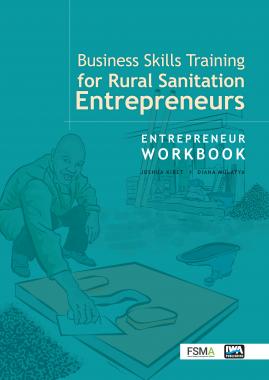 |
Business Skills Training for Rural Sanitation Entrepreneurs: Entrepreneur Workbook 
Business Skills Training for Rural Sanitation Entrepreneurs: Entrepreneur Workbook

This workbook is a companion to the Trainer’s Guide, available here [1].
This book comes out at a very opportune time when the sector is struggling with sanitation marketing that is considered an organic next step for rural communities that have been declared open defecation free. Besides, this publication comes in to address the gaps that face the peri-urban spaces that are facing population explosion and require innovative ways of dealing with mostly non-sewered sanitation services.
This guide/manual was developed as part of a training package to support business development skills training for local sanitation entrepreneurs in Kenya. Financial and technical support was provided by the United States Agency for International Development (USAID) under the Kenya integrated water and sanitation (KIWASH) project. KIWASH was a five year (2015-2020) project implemented by the Development Alternatives Incorporation (DAI) across nine counties. One of the key goals of KIWASH was to help trigger and activate demand for low cost affordable sanitation technologies in rural and low income communities.
The overall objective of this manual is to equip sanitation specialists and public resource persons with the basic concepts and tools, to facilitate entrepreneurship and financial literacy training for start-up sanitation entrepreneurs in rural communities. Specifically, this manual is designed to help participants:
1) Learn the basic concepts of entrepreneurship and characteristics of successful entrepreneurs;
2) Learn and practice essential marketing techniques for sanitation products and services;
3) Develop money management competencies necessary to succeed as a small-scale entrepreneur;
4) Build necessary leadership and management skills to grow successful sanitation enterprises.
Overall, the guide/manual is useful in guiding implementation of sanitation marketing projects, and provides concise content for nurturing and building the capacity of local sanitation enterprises/entrepreneurs. Improved business performance by these businesses means timely response to demand from households.
This book is a toolkit which incorporates a Training Guide/Manual as well as a Workbook for entrepreneurs.
Publication Date: 15/07/2020ISBN13: 9781789061758eISBN: 9781789061765Pages: 64 |
Print:
|